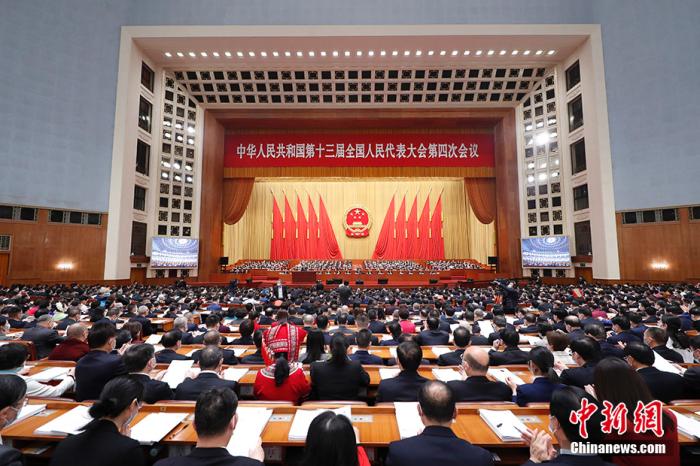(Observation of the NPC and CPPCC) Why did the "Basic Law" of the National People's Congress system be revised for the first time?
China News Service, Beijing, March 5 (Reporter Liang Xiaohui) The Organic Law of the National People's Congress and the Rules of Procedure, known as the "Basic Law" of the National People's Congress System, are ushering in the first revision in more than 30 years.
On the 5th, the draft amendments to the two laws "jointly" were submitted to the Fourth Session of the 13th National People's Congress for deliberation.
This is the 7th consecutive year since 2015 that China has deliberated important legal bills at the level of the National People's Congress.
On March 5, the Fourth Session of the Thirteenth National People's Congress opened in the Great Hall of the People in Beijing.
Photo by China News Agency reporter Sheng Jiapeng
In the Chinese legal system, this "one law, one rule" is known as the "Basic Law" of the People's Congress because it stipulates the organizational system, working system, and working procedures of the People's Congress.
Specifically, China's current National People's Congress Organic Law was enacted in 1982 and stipulates the powers and duties of the National People's Congress, the Standing Committee, various committees, and representatives.
Historically, it was formulated and promulgated by the same National People's Congress as the "82 Constitution", and some legal scholars also called it "a constitutional law."
The Rules of Procedure of the National People's Congress were established in 1989, and it stipulates the question of how the National People's Congress will be held.
In this law, there are answers to when the conference is held, how to propose and deliberate bills, how to review work reports, and review national plans and budgets.
Why should the "one law, one rule" be revised?
In short, the two laws have been in operation for more than 30 years, and the reality has undergone some changes.
For example, at present, the committees of the National People's Congress have increased from 6 in 1982 to 10, and the names such as "Constitution and Law Committee" have been changed, and the law needs to be updated; after the reform of the supervision system, the NPC and its Standing Committee Related content also needs to be added to the law.
From the perspective of legislative technology, China’s current laws are accustomed to establishing "general provisions," but like the National People’s Congress Organic Law, it has been formulated earlier and has not yet had this legislative custom.
In this revision, it is planned to set up a chapter of "General Provisions" in the Organic Law of the National People's Congress in accordance with current practice.
How to modify the two laws?
In addition to updating in accordance with the above-mentioned requirements, the draft amendments to the two laws show several special features.
One is to highlight people's democracy.
The draft amendment to the National People's Congress Organic Law includes "full-process democracy", including "adhering to full-process democracy" and "listening to the opinions and suggestions of the people", which represents "giving full play to the role of full-process democracy."
The second is to be more efficient.
Appropriately summarizing the experience of the "essential" People's Congress under the epidemic prevention and control last year, the draft amendments to the National People's Congress rules of procedure put forward a principled requirement for the holding of the People's Congress: reasonable arrangement of the meeting schedule and improvement of the quality and efficiency of the proceedings.
At the same time, the procedures for reviewing legal cases were streamlined.
The third is greener.
The draft amendment to the Rules of Procedure of the National People's Congress clarified the electronic format of meeting documents for the first time, adding provisions: National People's Congress meetings use information technology to promote the electronicization of meeting documents and materials; meeting briefings, speech records or abstracts can be in paper or can be For the electronic version.
Judging from the draft amendment, this amendment makes "one law, one rule" more in line with the current reality and younger, and will also inject more "young factors" into China's fundamental political system that has been in operation for more than 60 years.
(Finish)

